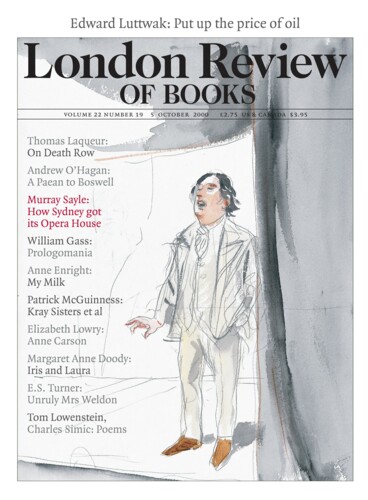Today – if the date at the bottom of this page is anything to go by – is National Poetry Day. Since ‘today’ is a week or two off, at least for readers in the UK, there’s still a bit of time to get ready, and what better way to prepare than by reading The Poet’s Manual and Rhyming Dictionary by Frances Stillman. Thames and Hudson first published it in 1966 – even then it was based on The Improved Rhyming Dictionary by Jane Shaw Whitfield, in its turn an updated version of an earlier unimproved edition – and they’ve reprinted it a dozen times since, most recently last month. So it must be popular, like those 60p-a-minute phone lines you can call to get crossword solutions. Depressing, isn’t it? Perhaps The Poet’s Manual counts among its readers the people who sporadically fire off letters to the LRB complaining about poems that don’t rhyme; it’s almost certainly indispensable for those on the other side who assemble parodies of poems that do. Such speculation aside, for only £9.95 any aspiring rhymester can gain access to hundreds of lists of thousands of words, arranged according to the way their syllables chime: ‘a reference tool that no writer of verse can afford to be without’ – God knows how they managed before the 1960s. Byron is referred to in the introduction, but if he’d stuck to what’s on offer in the Manual, Don Juan wouldn’t have achieved quite the standing it has. Take, for example, that famous couplet from Canto I: ‘But – Oh! Ye lords of ladies intellectual,/Inform us truly, have they not hen-pecked you all?’ Had he paused after the first line to reach for his well-thumbed copy of the Manual, the best he could have come up with would have been ‘ineffectual’; and there’s no entry at all to account for ‘adultery’, which is, as everyone knows, ‘much more common where the climate’s sultry’.
The introduction begins: ‘To a certain extent a poet is born, not made – the reverse of this statement is equally true.’ In support of this not unreasonable remark, we are referred to ‘the wit’ who said that ‘genius is 10 per cent inspiration and 90 per cent perspiration’ – they’re listed next to each other on page 139 – but ‘perhaps erred in his proportions’ (Stillman has more faith in natural talent). Whoever this ‘wit’ – 98 rhymes, including ‘Messerschmitt’, ‘Jesuit’ and ‘lickety-split’, and none of them obscene – may have been, he certainly erred in misquoting Thomas Edison (no rhymes), who suggested the ratio was 1 to 99, as we are reliably reminded in Science Says: A Collection of Quotations on the History, Meaning and Practice of Science, edited by Rob Kaplan (Stonesong, £19.95). Here Edison is joined by, among others, Newton, Darwin, Einstein, Curie and Woody Allen: ‘The universe is merely a fleeting idea in God’s mind – a pretty uncomfortable thought, particularly if you’ve just made a down payment on a house.’ Perhaps the most profound observation of all comes from Montgomery Scott, a.k.a. ‘Scotty’, chief engineer aboard the USS Enterprise, addressing Captain James T. Kirk: ‘But I canna change the laws of physics, Captain!’ Other than travelling faster than the speed of light, that is.
Iron Press have published a collection called Star Trek: The Poems, edited by Valerie Laws. Many if not most of them don’t rhyme, but several address the most famous of all grammatical conundrums. Between the sections entitled ‘To Boldly Glow’ and ‘Beyond the Final Frontier’ there are some haiku, one of which is called ‘To Boldly Go . . .’ and is reprinted here in its entirety:
and why not? –
when everything else
was possible
what’s a split infinitive?
The form, you will notice, is appropriate to the content, but if a haiku that ventures beyond the final frontier of 17 syllables isn’t the right kind of paradox for you, have a look at The Visionary’s Handbook by Watts Wacker and Jim Taylor (Capstone, £15.99), which has nothing whatsoever to do with poetry: the subtitle is ’Nine Paradoxes that Will Shape the Future of Your Business’. Jim Taylor is ‘a lecturer and consultant to cutting edge companies’ (such as Sabatier?) and Watts Wacker, a ‘business futurist’, is ‘a man in a cowboy outfit’, which means, presumably, that he wears a Stetson, spurs and chaps: ‘outfit’, I take it, doesn’t refer to the mysteriously unnamed think tank at which he is ‘the futurist’. One of the nine so-called paradoxes is the ‘paradox of value’, which states that value is dependent on ‘a buyer’s perception of worth’ – illustrated by the way market value can be inflated by a cowboy hat and a bunch of internally consistent ‘paradoxes’.
Send Letters To:
The Editor
London Review of Books,
28 Little Russell Street
London, WC1A 2HN
letters@lrb.co.uk
Please include name, address, and a telephone number.

